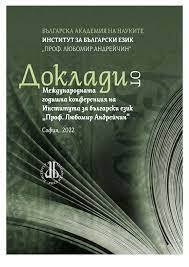Концептът разум / Vernunft в немския и българския език
The Concept pазум / Vernunft in German and Bulgarian
An Online Study
Author(s): Hristina Vihrogonova
Subject(s): Language studies, Language and Literature Studies, Theoretical Linguistics, Applied Linguistics, Lexis, Semantics, Comparative Linguistics, Philology
Published by: Институт за български език „Проф. Любомир Андрейчин“, Българска академия на науките
Keywords: linguoculturological concept; conceptual metaphor; linguistic picture of world
Summary/Abstract: The present article is focused on the analysis of the results exhibited in Questionnaire Survey entitled „Metaphorical Thinking in Language“. The basic aim is to make comparison of the term REASON/VERNUNFT, and how it is perceived and presented in both German and Bulgarian. Data of the Survey are graphically presented. The Survey has comparative character and, as we may say, is done in the spirit of Cognitive Linguistics. As mutual base of comparison serves “Conceptual metaphor“, described in the book „Metaphors we Live by“, written by George Leikoff and Mark Johnson. In the process of linguistic description concerning the discussed Concept, many similarities are established, which is explained by its universality. The Concept itself as well, has similar metaphorical perception typical for the two languages, which is deeply rooted in their linguistic consciousness. The similarities are established with the help of Conceptual Metaphors, that play the role of universal instrument of human thinking as far as abstract linguistic essences are concerned.
- Page Range: 513-519
- Page Count: 7
- Publication Year: 2022
- Language: Bulgarian
- Content File-PDF

